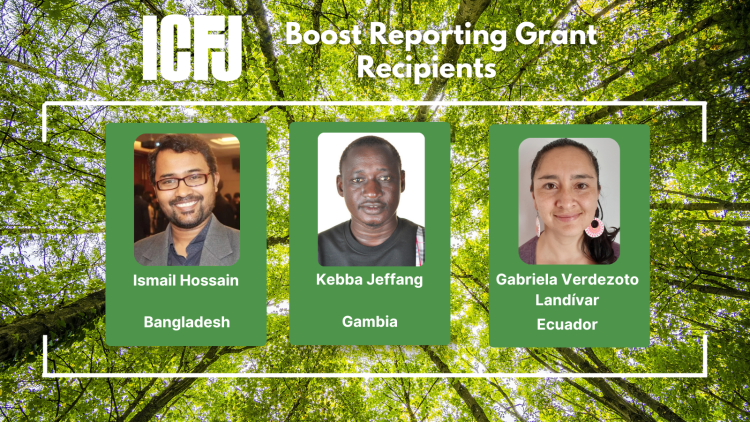Journalists from Gambia, Bangladesh and Ecuador will pursue reporting on climate-related issues with support from ICFJ’s Boost Reporting Grants.
Three journalists were selected to receive funding through the pilot program, designed to expand ICFJ’s offering to its global network. Created in mid-2024, the initiative provides individual reporting grants for projects that might not fit under existing ICFJ initiatives.
The response to the first call for applications was overwhelming, with nearly 500 submissions. An internal ICFJ committee reviewed the applications.
Recipients of the inaugural Boost Reporting Grants are:
- Ismail Hossain, who will explore how the absence of specific allocations for climate impacts in local government budgets is affecting Bangladesh’s most vulnerable districts;
- Gambian journalist Kebba Jeffang, who will investigate the impact of the increasing salt-water intrusion into fresh water on rice production in Gambia and Senegal amid continuous decline in productivity and worsening food security; and
- Ecuadorian journalist Gabriela Verdezoto Landívar, who will use data to examine the nexus between a lack of government transparency and the growth of extractive industries in the Amazon.

“All three journalists in our first Boost cohort are reporting on critical issues affecting people’s lives – issues that deserve greater attention,” said Aliza Appelbaum, ICFJ’s vice president of programs. “We’re proud to support them.”
The reporting period begins in mid-January and will run for three months. All fellows will receive $2,000 each to complete their projects.
The Boost grants are supported by ICFJ's It Takes a Journalist campaign,designed to help journalists meet the most urgent challenges of today. ICFJ is grateful to the scores of individual donors who have contributed to the campaign fund to date, allowing the organization to flexibly deploy resources where they are most needed.